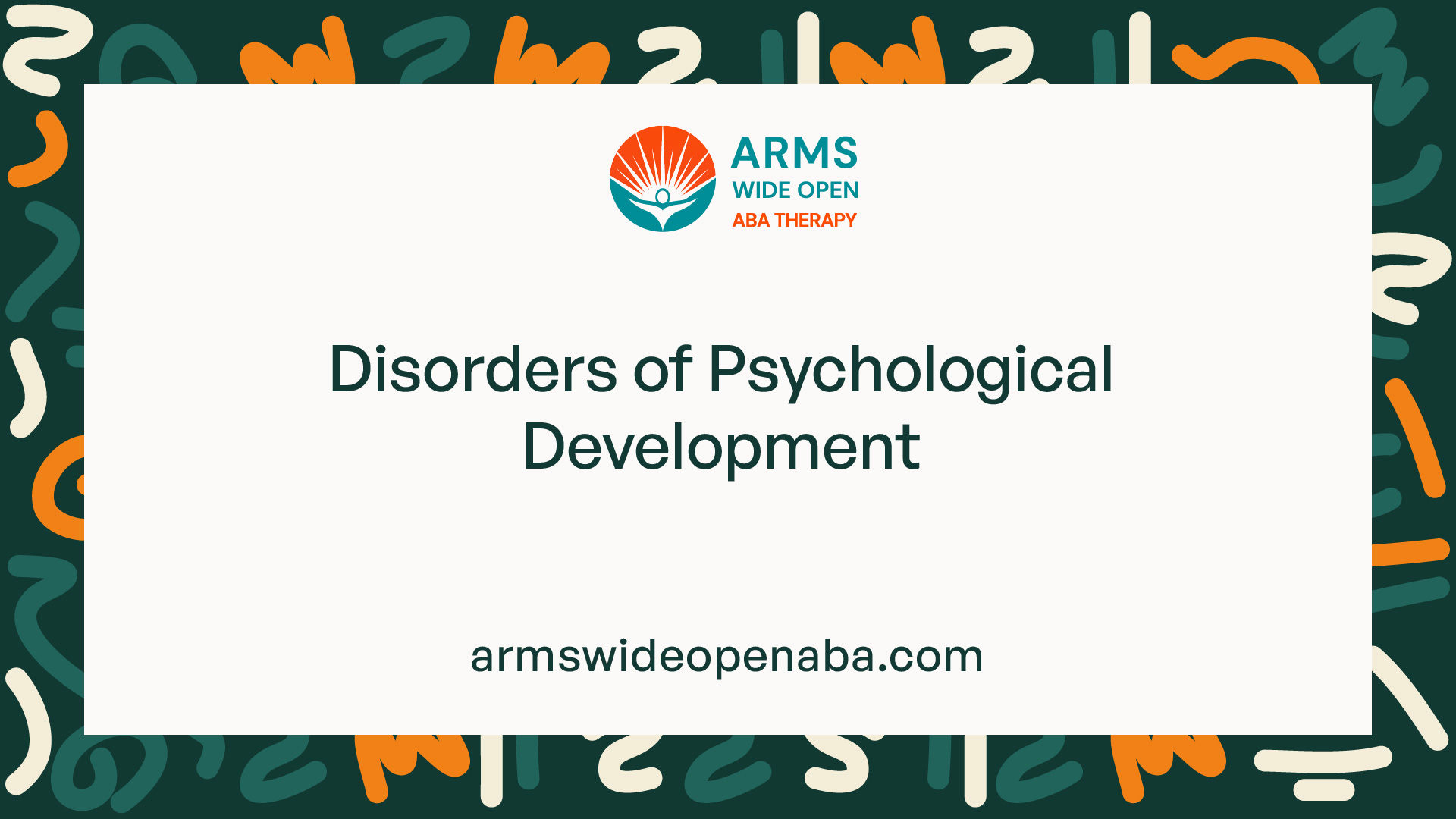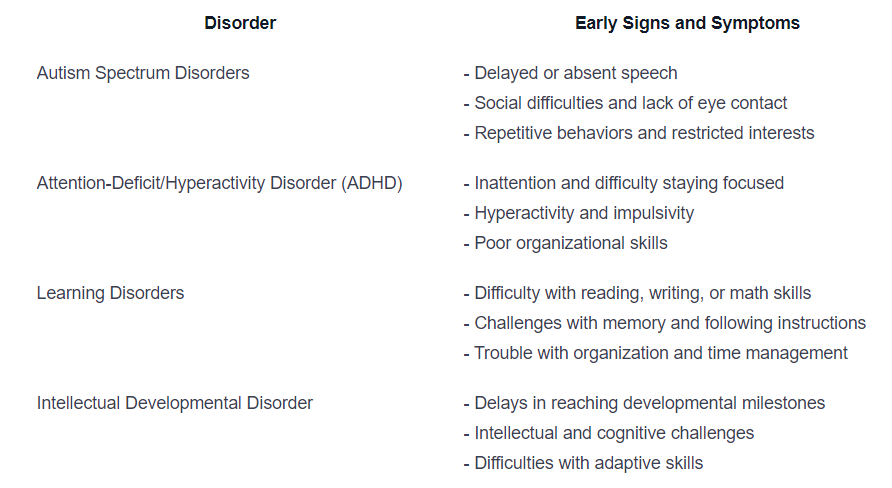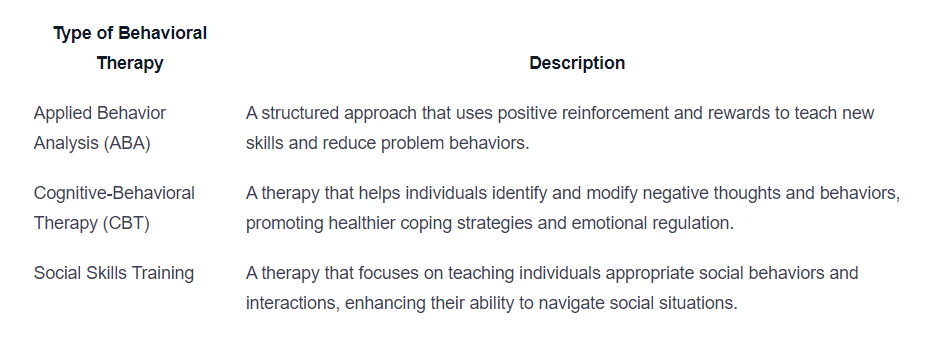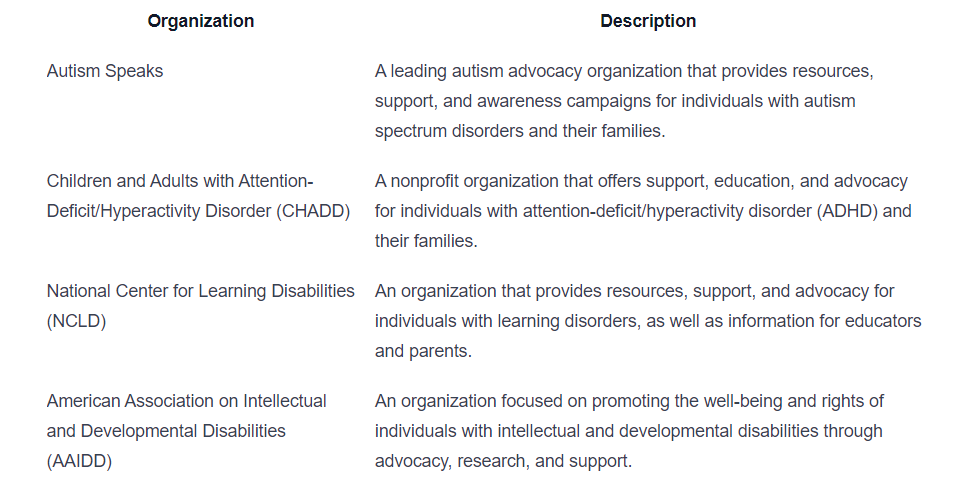Disorders of Psychological Development
Demystifying disorders of psychological development: Learn about causes, diagnosis, and effective treatments for individuals and families.

Understanding Disorders of Psychological Development
Disorders of psychological development encompass a wide range of conditions that affect the cognitive, emotional, and behavioral aspects of an individual's development. These disorders can manifest in childhood and continue into adulthood. Understanding the definition and scope of these disorders is essential for recognizing and addressing them effectively.

Definition and Scope
Disorders of psychological development refer to conditions that disrupt the normal developmental processes, leading to significant impairments in social interaction, communication, and behavior. These disorders can affect various domains, such as language skills, cognitive abilities, motor skills, and social functioning.
The scope of disorders of psychological development is vast and includes conditions such as autism spectrum disorders, attention-deficit/hyperactivity disorder (ADHD), learning disorders, and intellectual developmental disorder. Each of these disorders has distinct characteristics and diagnostic criteria, but they all share the common feature of impacting an individual's development and daily functioning.
Importance of Recognizing and Addressing These Disorders
Recognizing and addressing disorders of psychological development is crucial for several reasons. First and foremost, early identification and intervention can significantly improve outcomes for individuals with these conditions. By identifying and addressing these disorders in their early stages, appropriate therapies and interventions can be implemented to support the individual's development and minimize the impact of the disorder on their daily life.
Moreover, understanding and addressing these disorders is essential for promoting inclusivity and reducing stigma. By increasing awareness and understanding of these conditions, society can create an environment that supports individuals with disorders of psychological development and provides them with the necessary accommodations and resources they need to thrive.
Recognizing and addressing these disorders is a collaborative effort that involves professionals from various fields, including healthcare providers, educators, psychologists, and researchers. By working together, we can ensure that individuals with disorders of psychological development receive the support, resources, and interventions they need to reach their full potential.
In the following sections, we will explore different types of disorders of psychological development, their causes and risk factors, diagnosis and assessment processes, as well as treatment and management approaches. By delving deeper into these topics, we can gain a comprehensive understanding of these complex disorders and how best to address them.
Types of Disorders
When it comes to disorders of psychological development, several conditions can affect individuals. Understanding these different types of disorders is crucial for recognizing and addressing the unique challenges faced by those affected. Here are four common types of disorders in this category:
Autism Spectrum Disorders
Autism Spectrum Disorders (ASD) are a group of neurodevelopmental disorders characterized by difficulties in social interaction, communication, and repetitive patterns of behavior. ASD is a complex condition that varies in severity and presentation. Below are some key statistics related to autism:

Attention-Deficit/Hyperactivity Disorder (ADHD)
Attention-Deficit/Hyperactivity Disorder (ADHD) is a neurodevelopmental disorder characterized by persistent patterns of inattention, hyperactivity, and impulsivity that interfere with daily functioning. ADHD can affect both children and adults. Here are some notable facts about ADHD:
FactValuePrevalenceAround 5-10% of children worldwideMale-to-Female Ratio2-3:1Average Age of DiagnosisAround 7 years
Learning Disorders
Learning Disorders, also known as learning disabilities, refer to a range of conditions that affect the acquisition and use of academic skills. These disorders can impact reading, writing, math, or other specific areas of learning. Below are some key facts about learning disorders:

Intellectual Developmental Disorder
Intellectual Developmental Disorder (IDD), formerly referred to as mental retardation, is characterized by limitations in intellectual functioning and adaptive behavior. IDD is typically diagnosed in childhood and affects an individual's cognitive abilities and daily functioning. Here are some important details about IDD:

Understanding these different types of disorders can help individuals, families, and professionals recognize the signs and symptoms, seek appropriate evaluations and treatments, and provide the necessary support for those affected. It's important to remember that each disorder is unique and requires a tailored approach to intervention and management.
Causes and Risk Factors
Understanding the causes and risk factors associated with disorders of psychological development is essential for recognizing and addressing these conditions. The causes of these disorders are complex and can involve a combination of genetic, environmental, and neurobiological factors.
Genetic Factors
Genetic factors play a significant role in the development of psychological disorders. Certain genetic variations and mutations can increase the likelihood of developing these conditions. For example, in the case of autism spectrum disorders, studies have identified specific genes that are associated with an increased risk. However, it's important to note that genetic factors alone are not sufficient to cause these disorders. They often interact with other factors, both genetic and environmental.
Environmental Factors
Environmental factors also contribute to the development of psychological disorders. These factors include prenatal influences, such as exposure to toxins during pregnancy, maternal stress, and complications during childbirth. Postnatal factors, such as early life experiences, parenting styles, and social interactions, can also impact psychological development.
It is worth noting that environmental factors can interact with genetic factors, influencing the expression and severity of the disorders. For instance, a child with a genetic predisposition to ADHD may be more susceptible to the adverse effects of certain environmental factors, such as exposure to lead or a chaotic home environment.
Neurobiological Factors
Neurobiological factors refer to the underlying brain abnormalities or differences that contribute to the development of psychological disorders. These factors can affect brain structure, function, and connectivity. For example, individuals with autism spectrum disorders often have atypical neural connectivity patterns, while those with ADHD may exhibit differences in the prefrontal cortex and dopamine regulation.
Understanding the neurobiological basis of these disorders allows researchers and clinicians to develop targeted interventions and treatments. Advances in neuroimaging techniques have provided valuable insights into the brain mechanisms underlying these disorders.
While these causes and risk factors shed light on the complexities of disorders of psychological development, it's important to remember that each individual's experience is unique. The interplay between genetic, environmental, and neurobiological factors varies from person to person, making it crucial to consider a multidimensional approach when assessing and addressing these conditions.
Diagnosis and Assessment
When it comes to disorders of psychological development, early diagnosis and assessment play a crucial role in providing appropriate support and intervention. This section will explore the early signs and symptoms of these disorders, the screening and evaluation processes involved, and the multidisciplinary approach to diagnosis.
Early Signs and Symptoms
Recognizing the early signs and symptoms of disorders of psychological development is key to early intervention. While the specific signs may vary depending on the disorder, there are some common indicators to look out for:

By being aware of these early signs and symptoms, parents, caregivers, and educators can seek appropriate professional guidance and support.
Screening and Evaluation Processes
The screening and evaluation processes for disorders of psychological development involve a comprehensive assessment conducted by healthcare professionals, psychologists, and educators. These processes typically include:
- Developmental Screening: This involves a series of standardized questionnaires or observations to identify potential developmental delays or atypical behaviors.
- Comprehensive Evaluation: A comprehensive evaluation is conducted by professionals who specialize in the specific disorder being assessed. It may include:
- Clinical Interviews: Healthcare professionals gather information about the individual's medical and developmental history, as well as any observed behaviors.
- Psychological and Cognitive Testing: Assessments such as intelligence and cognitive tests may be administered to evaluate the individual's strengths and weaknesses.
- Observation and Behavior Analysis: Professionals observe the individual's behavior in various settings to gather additional information about their social interactions, communication skills, and repetitive behaviors.
- Parent and Teacher Input: Information provided by parents, caregivers, and teachers is vital in understanding the individual's behavior and functioning across different environments.
Multidisciplinary Approach to Diagnosis
Diagnosing disorders of psychological development often requires a multidisciplinary approach, involving professionals from various fields. This collaborative effort ensures a comprehensive understanding of the individual's needs and facilitates accurate diagnosis. The multidisciplinary team may include:
- Pediatricians: Medical professionals who assess physical health and development, ruling out any underlying medical conditions.
- Psychologists: Experts in psychological assessments, who evaluate cognitive, emotional, and behavioral functioning.
- Speech and Language Therapists: Professionals who assess communication skills and language development.
- Occupational Therapists: Experts who assess fine motor skills, sensory processing, and adaptive behavior.
- Educators: Teachers and special education professionals who provide insights into the individual's educational needs and challenges.
By employing a multidisciplinary approach, the diagnostic process becomes more comprehensive and ensures that all aspects of the individual's development are taken into account. This holistic approach facilitates the development of tailored intervention plans and support strategies.
Understanding the early signs and symptoms, along with the screening and evaluation processes, is essential for identifying and addressing disorders of psychological development effectively. With early intervention and a multidisciplinary approach to diagnosis, individuals with these disorders can receive the support they need to thrive.
Treatment and Management
When it comes to disorders of psychological development, effective treatment and management strategies play a crucial role in improving the lives of individuals affected by these conditions. The treatment approach may vary depending on the specific disorder and the needs of the individual. Here, we will explore three common treatment and management options: behavioral therapies, medication options, and educational and supportive interventions.
Behavioral Therapies
Behavioral therapies are widely used in the treatment of disorders of psychological development. These therapies focus on modifying behaviors, developing skills, and improving social interactions. They are tailored to the individual needs of the person and often involve a multidisciplinary team of professionals, including psychologists, speech therapists, and occupational therapists.

Behavioral therapies are highly individualized and may be delivered in various settings, such as clinics, schools, or homes. The duration and intensity of therapy will depend on the specific needs of the individual and the goals of the treatment.
Medication Options
In some cases, medication may be prescribed as part of the treatment plan for disorders of psychological development. Medications are typically used to manage specific symptoms and can be beneficial when combined with other interventions. It's important to note that medication should always be prescribed and monitored by a qualified healthcare professional.

The decision to use medication should be carefully considered, taking into account the individual's specific needs, potential side effects, and the benefits of the medication in relation to the overall treatment plan.
Educational and Supportive Interventions
Education and support play a vital role in the overall management of disorders of psychological development. These interventions aim to provide individuals and their families with the necessary tools, resources, and guidance to navigate daily challenges and promote optimal development.

These interventions can significantly enhance the quality of life for individuals with disorders of psychological development and their families. By combining educational resources, supportive networks, and practical strategies, individuals can thrive in various aspects of their lives.
It's important to remember that treatment and management strategies should always be personalized to meet the unique needs of each individual. Collaborating with healthcare professionals, educators, and support networks can help create a comprehensive and effective plan for addressing the challenges associated with disorders of psychological development.
Support and Resources
When it comes to disorders of psychological development, accessing support and resources is essential for individuals and families. Thankfully, there are numerous organizations, educational resources, and coping strategies available to help navigate the challenges associated with these disorders.
Support Networks and Organizations
Support networks and organizations play a crucial role in providing assistance, information, and a sense of community for individuals and families affected by disorders of psychological development. These organizations are dedicated to raising awareness, advocating for the rights of individuals with these disorders, and offering various support services.
Here are a few notable support networks and organizations:

Educational and Advocacy Resources
Educational and advocacy resources are invaluable for individuals and families seeking information and guidance related to disorders of psychological development. These resources provide detailed explanations, research findings, and practical strategies for managing and understanding these disorders.

Coping Strategies for Individuals and Families
Coping with disorders of psychological development can be challenging, but there are coping strategies that individuals and families can employ to navigate these difficulties.
- Seek professional help: Consult with mental health professionals who specialize in the specific disorder to gain a better understanding and access appropriate interventions.
- Join support groups: Connect with other individuals and families facing similar challenges to share experiences, advice, and emotional support.
- Educate yourself: Learn as much as possible about the disorder to better understand its impact and identify effective strategies for managing symptoms and promoting overall well-being.
- Practice self-care: Prioritize self-care activities such as exercise, relaxation techniques, and hobbies to reduce stress and maintain mental and emotional well-being.
- Establish routines: Consistent routines can provide structure and predictability, which is beneficial for individuals with disorders of psychological development.
- Communicate openly: Foster open and honest communication within the family to address concerns, share feelings, and work together towards solutions.
By utilizing the support networks, educational resources, and coping strategies available, individuals and families can find the help they need to navigate the complexities associated with disorders of psychological development.
Sources
https://psychcentral.com/disorders/childhood-developmental-disorders
https://icd.who.int/browse10/2014/en#/F80-F89
https://www.kennedykrieger.org/patient-care/conditions/developmental-disorders
Similar articles
We’re here to help you

Our team is here to assist you in this process. Contact us for any assistance.
it’s easy to apply
We Accept Most Insurances
Our in-network insurance partnerships make ABA therapy more accessible to families throughout our service areas.







Our Insurance Process
We'll request your insurance details to help us verify your plan's coverage for ABA therapy. Once we've received this information, we'll walk you through your benefits, including copayments, deductibles and out-of-pocket maximums, so you know what to expect in advance.
Our team will then handle the preauthorization and all the necessary paperwork.
.svg)





















.jpeg)


































.jpeg)




.jpeg)







.jpeg)











.jpeg)
















